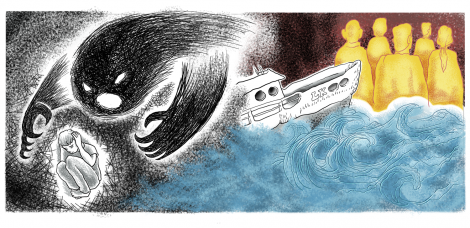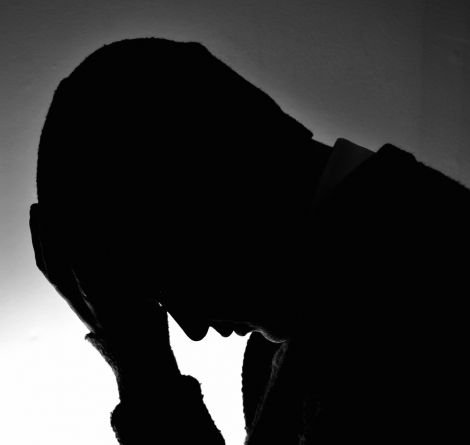News / Ex-fisherman talks of sexual abuse at sea
A MAN who grew up in Shetland has spoken about the lifelong impact of being repeatedly subjected to vicious sexual abuse by an older man on a fishing boat when he was in his early teens.
Kevin (not his real name) no longer stays in the islands, but said he wanted to speak out to encourage other victims of sexual abuse in Shetland to seek help – and avoid suppressing the problem in the way he did for so many years.
After speaking to friends and relatives about his horrific ordeal, their overwhelming support and sympathy made him realise that no one was going to make fun of him and that what happened was no fault of his own.
Around a decade after the abuse took place, Kevin finally plucked up the courage to contact the police.
Following several months of investigation, a report was submitted to the procurator fiscal who decided against bringing the case to court due to a lack of corroborating evidence.
This case is one of many that have been thwarted by Scotland’s law requiring a witness to back up the victim’s story, which there is a growing campaign to change in cases of sexual abuse.
The allure of life at sea
Kevin first began going to sea on a fishing boat as a child. His family had not long moved back to Shetland, and the prospect of going to sea was an alluring one.
He knew the registration number of each boat in the Shetland fleet. He’d even skip school in order to spend more time on the water.
“I loved hurling about on the boat,” he said.
But soon after he went to sea, an older crew member began coming into his cabin where he subjected him to violent sexual abuse.
Kevin remembers a bullying culture among a minority element at sea in those days and, as a boy learning his trade during school holidays, he knew he was “going to get all the grief, get pushed at, shouted at”.
Become a member of Shetland News
He said the older man – around 20 years his senior – promised to “look after” him, something he now recognises as “grooming”.
Recalling the first incident, which took place in the cabin he shared with another crew member who was in the boat’s galley working at the time, he said: “I can remember it like it was yesterday, I can remember what he was wearing, I can remember the entire layout of the cabin.
“He said ‘I’ve got something to show you’, and he took out a porn mag, and kinda pulled me to sit down beside him. He said ‘look at this’, and I can remember feeling just really uncomfortable and uneasy.
“I was a young boy, and obviously I was discovering sex. There was this sense of titillation, but it wasn’t enjoyable at all. I kept trying to move away. He started putting my hand down his breeks, and started kinda doing the same to me.
“I was fighting him off and fighting him off, but I wasn’t strong enough, and in the end I just gave up.”
The loud noise of the engine meant no one else on board could hear his shouts and screams, and he realised that “it didn’t matter what I was going to do, nobody was going to help, so I had to do what he asked”.
After forcing himself upon the boy, the man made Kevin touch his penis. He then forced the boy to touch himself before leaving the cabin.
“I remember bursting into tears, then he cuddled me, and I can mind the smell of him, and him laughing and saying ‘it’s alright, it’s just what happens to everybody on the boat, yun’s dy initiation, I’ll not do it again’…
“I thought that I’d done something wrong, and I thought that everybody on the boat knew, and that they thought this was hilarious.”
Finally leaving the boat
The abuse continued for more than a year, on and off, and ended when he was 15.
One of the most severe and disturbing incidents occurred when the fishing boat was tied up in Lerwick Harbour. After taking hallucinogenic drugs, Kevin was afraid of going home to his mother and instead went on board to sleep.
His abuser came in and he could immediately tell he was “hammered” and “stinking of spirits”.
“I was kicking him and punching him. He beat me down. It’s the most afraid I’ve ever been in my life. He was sticking his fingers inside me, and hitting me, and spitting on me, calling me a ‘fucking slut’.
“Then he got right in the bunk, a tiny bunk, cuddled up to me. I was gowling my eyes out, and he knew. He was like, ‘I’ll go and leave dee alone’. He knew this had been a really bad experience.”
Shortly afterwards, with the boat berthed in a port on the Scottish mainland, he ended a heated exchange with his abuser by telling him to “fuck off”. With tears flooding in his eyes, he left the boat for the final time.
Kevin took refuge at the local Fishermen’s Mission, which gave him a bed for the night. He recalls: “Sitting in this old ‘70s-decorated room, Friday the 13th was on the TV, all there was to read was a bible. I just felt so raw. It was like I’d been washed up on the shore.”
He had already endured a difficult upbringing. But the impact of the sexual abuse left his life in chaos. He frequently experienced suicidal feelings and became increasingly reliant on alcohol and other drugs.
Turning to drink and antidepressants
After working on different fishing boats for a few years, he decided to escape and moved to a large English city. While staying there, he eventually summoned the strength to talk to a GP – the first time he’d ever told anyone about the abuse.
At that point he was given counselling and prescribed antidepressants [much later he was diagnosed with a personality disorder]. But for some time his life amounted to sitting around a flat in a rough part of the city surrounded by empty beer bottles and old newspapers.
Every time the giro arrived he’d cash the cheque and spend it all on strong alcohol, which he’d use to wash down Prozac pills. He didn’t really know anyone in the city, and now admits it was a precarious predicament.
“I’d drink as much vodka as I could stomach and as many antidepressants as I could take, and fall in and out of consciousness. There was never an intent to kill myself. But I was falling into a pattern, and I guess I could have died.”
He described it as “a complete disassociation with the world, with everything. I wouldn’t speak to my family for months and months and months at a time.”
But he did make a “big connection” with his counsellor, and she encouraged him to speak to his immediate family some months after he started the counselling sessions.
Kevin later returned to Shetland, switched career and started a family. But the demons never left him. One of the most difficult aspects was the attendant fear and paranoia that living in such a small island community can bring.
He broke off a relationship with the woman he was engaged to, and was coming to realise that he had “a problem maintaining relationships” and was “pushing everybody away”.
Empathy from the most ‘bloke-y blokes’
It was a chance encounter, in his new line of work, with his abuser that prompted him to take the matter to the police.
Kevin has nothing but praise for the officers who worked on the case. He was confident they “never, ever doubted” that he was telling the truth and did everything they could to bring a prosecution.
The main officer on the case, who is now retired from the force, told him: “I will always go through my life feeling sad because I never got you justice.”
But in the end, the absence of corroboration – a law that has been under the microscope in Scotland over the past few years – meant his abuser escaped with a police caution.
Kevin said the officer told him he had “no reason to disbelieve” his allegations. At one stage, questioning of his abuser was stopped due to concerns about the man’s health.
Living in Shetland eventually became suffocating. Kevin now avoids returning to the islands, even to visit family, because of the unwanted memories it stirs.
There was another chance encounter with his abuser outside a casino in Scotland not so long ago, where the opportunity to exact revenge presented itself.
He remembers thinking “this is the defining moment of my life”, but chose to walk away. “I could be in jail just now. I would have genuinely kicked him to death,” he says.
Having recently spoken to a wider circle of friends about what happened, he was struck by how it was often the most “bloke-y blokes” who showed the greatest empathy.
Now he sees clearly that the various threats – everyone on the boat would laugh at him; his family and friends would be ashamed and would disown him – were all part of the cruelty perpetrated on him.
“The language that an abuser uses is there to disempower you. It’s there to make you feel like you’re the guilty party, that you’ve done something wrong, that you should be ashamed.”
Transforming victims into survivors of abuse
Alarmingly, he has spoken to “over a dozen people” in Shetland who said they’d also been abused and had not done anything about it. Some of the abuse is still happening today; other instances took place 30 years ago.
“That’s what really made me think about this. What happened to me wasn’t very nice, that’s without a doubt, but there’s a wider issue here that needs to be dealt with.“
“You need to turn victims of abuse into survivors of abuse, and the only way you do that is by taking control of the language again. Nobody in their right mind is going to laugh at you if you told them you’ve been sexually abused.”
He says the biggest difficulty is how to tackle the problem – that there are paedophiles and sex offenders living, and offending, in the islands today – without “creating a culture of fear and hysteria”.
But it is essential to correct those who say “this sort of thing doesna happen in Shetland” for the sake of young children whose “lives are being trampled over before they’ve even got the chance to start living”.
The paradox of coming from a small place with a strong sense of community is that it can add to the alienation people feel when they bottle up serious problems.
Living in a goldfish bowl magnified the sense of shame he felt, and it was only finding the bravery to talk to others that allowed him to benefit from the rally-round in support that is so characteristic of Shetland.
By speaking about his own experiences, Kevin hopes others will take the steps necessary to move on as best they can – and avoid heaping any more misery on top of what they have already endured.
He adds: “The words can sit at the tip of your tongue for years, and there’ll be people that have been abused in Shetland that’ll be reading this that know about the amount of times they nearly said something to somebody and they didn’t.
“When I walked out of the police station after I’d given my initial statement, [the police officer] patted me on the back and said ‘just suck in the air, because the world’s going to feel like a different place today’. And he wasn’t wrong.
“Maybe it didn’t go quite according to plan for me, but I’ve got justice in a sense. I’m not the victim. Everybody around me knows this is real. It happened.”
- Look out for Shetland News’ forthcoming in-depth interview with Victim Support Shetland about the importance of abuse victims seeking help. Victim Support Scotland (Helpline 0345 603 9213) provides victims with free and confidential emotional and practical assistance and information about the criminal justice system.
Become a member of Shetland News
Shetland News is asking its many readers to consider paying for membership to get additional features and services: -
- Remove non-local ads;
- Bookmark posts to read later;
- Exclusive curated weekly newsletter;
- Hide membership messages;
- Comments open for discussion.
If you appreciate what we do and feel strongly about impartial local journalism, then please become a member of Shetland News by either making a single payment, or setting up a monthly, quarterly or yearly subscription.

































































